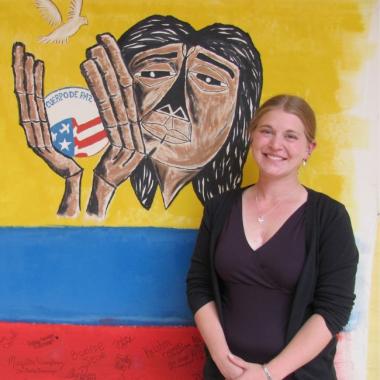1. What do you do?
My core responsibilities relate to project management and federal grants compliance and reporting for a nonprofit organization. In reality, I am a jack of all trades, working to help different departments with communication, efficiency, grants compliance and reporting, data management and upkeep, public policy changes, and research.
2. What's the coolest part of your job?
I would say the best part of my job is providing support to different arms of the organization, as it allows me to understand the different (and sometimes competing) priorities across the organization. With this knowledge, I can provide insight that helps everyone to work together more efficiently towards our larger goals.
Throughout my career, I have found that providing "behind the scenes" support is my bread and butter, ensuring that my coworkers can maximize their impact. Having the same tasks day in and day out becomes too monotonous for me, so I have a habit of seeking out positions that allow me to wear different hats daily. I can always find new skills to acquire and improve, and the policy landscape for immigration is constantly in flux, providing learning and problem-solving opportunities on a daily basis.
3. Why are you passionate about it?
My passion for working in the immigration and refugee policy sphere stems from my belief that humanity is stronger and better for its diversity, and that a bright future depends on us working together.
The heightened polarization around this work demonstrates the critical need for progress. We have a myriad of challenges and opportunities, and I am hopeful that we can combine the heightened attention to make positive changes. It's not the work of one person, one community, or even one lifetime, but I'm excited to contribute my energy to this incredible field.
4. Which skills from your IAC degree have helped you be successful in this career?
I would say that the most useful skill from IAC that's translated into my everyday policy and research work is path-gaming. Path-gaming and scenario writing are tools used in government and business planning to anticipate the real-world impacts of different policy decisions.
Public policy and immigration work involve digging into the details and anticipating externalities. A solid background in collaborative problem-solving and the ability to approach problems from alternate perspectives serve me daily, whether in the mundanities of office work and database management or in advocacy and public policy research.
Additionally, the language skills I acquired from the School of Modern Languages allow me to communicate and collaborate with a wider group of colleagues, increasing the service and skills I can bring to my community.
5. What's your #1 tip for students and alumni interested in your field?
My number one tip for anyone interested in working for nonprofits or in public policy in general is to try new things and take advantage of every opportunity that comes your way. Don't limit yourself to one field or one set of skills.
Service in AmeriCorps and the Peace Corps gave me incredible networks of colleagues and friends and helped broaden my horizons and empathy. My experience in veterinary medicine grew my communication skills, technical writing, and team management experience. Grant writing and fundraising improved my understanding of nonprofit financial management and federal programs. Serving as the chief of staff to a Georgia General Assembly member allowed me to improve my networking and practical knowledge of lawmaking and public service. Internships during graduate school allowed me to deep-dive into research projects both within and without my field. And working in nonprofits is a constant exercise in resource management and community organizing.
While it feels like my career trajectory has had no consistency, I wouldn't be able to maximize my impact without the plethora of experiences that I said "Yes, and" to. Sometimes it leads to personal growth, sometimes professional growth, and sometimes both!
Meet more featured alumni in the Sam Nunn School of International Affairs!

